The Islamic Dua “Inna Lillahi Wa Inna Ilayhi Rajiun” holds much significance in the lives of Muslims. It serves as a reminder of our connection with Allah and our mortality.
Each word in the Quran and Hadith carries immense significance and offers invaluable guidance to humanity. This phrase, a gift from Allah and His Prophet, provides us with a source of strength, supplication, and reflection.
The Universal Truth: Inevitability of Death
The Quran, Allah’s divine revelation, illuminates the undeniable and universal truth that every human being must confront: the certainty of death. Regardless of one’s social status, wealth, or intellectual prowess, all souls shall eventually return to their Creator. This reality has been emphasized from the dawn of humanity and will endure until the end of time.
In Surah An-Nisa (4:78), Allah SWT conveys this profound message:
“Wherever you may be, death will overtake you, even if you should be within towers of lofty construction.”
These verses underscore that death is a fate no one can escape, serving as a humbling reminder of our mortality and the ultimate return to our Creator.
Inna Lillahi Wa Inna Ilayhi Rajiun: A Universal Remedy
The beautiful aspect of “Inna Lillahi Wa Inna Ilaihi Rajiun” lies in its versatility and applicability. While often recited as an expression of condolences upon the death of a beloved person, its scope extends far beyond such moments. This sacred phrase is not confined to specific circumstances; rather, it serves as a universal remedy for any situation that brings trouble, stress, or pain into one’s life.
Benefits and Virtues of “Inna Lillahi Wa Inna Ilayhi Rajiun”
The profound benefits of reciting “Inna Lillahi Wa Inna Ilaihi Rajiun” become apparent when understood and practiced correctly. Let us delve into the remarkable virtues associated with this phrase:
- Reward on the Day of Judgment: The act of reciting this phrase during moments of adversity earns the believer a special reward from Allah. It is an acknowledgment that trials and tribulations are part of Allah’s divine plan, and by bearing them with patience, one merits His reward.
- Divine Pleasure: Allah is pleased with His servants who turn to Him in times of distress, declaring their submission to His will. This act of humility and trust strengthens the bond between the believer and the Divine.
- Substitution with Something Better: “Inna Lillahi Wa Inna Ilaihi Rajiun” is a supplication to Allah to replace what has been lost with something superior. It reflects unwavering faith in Allah’s wisdom and His ability to grant blessings even in times of loss.
- Patience (Sabr): This phrase encourages the cultivation of patience during challenging moments. It reminds us that adversity is a test from Allah, and those who demonstrate patience are promised a reward.
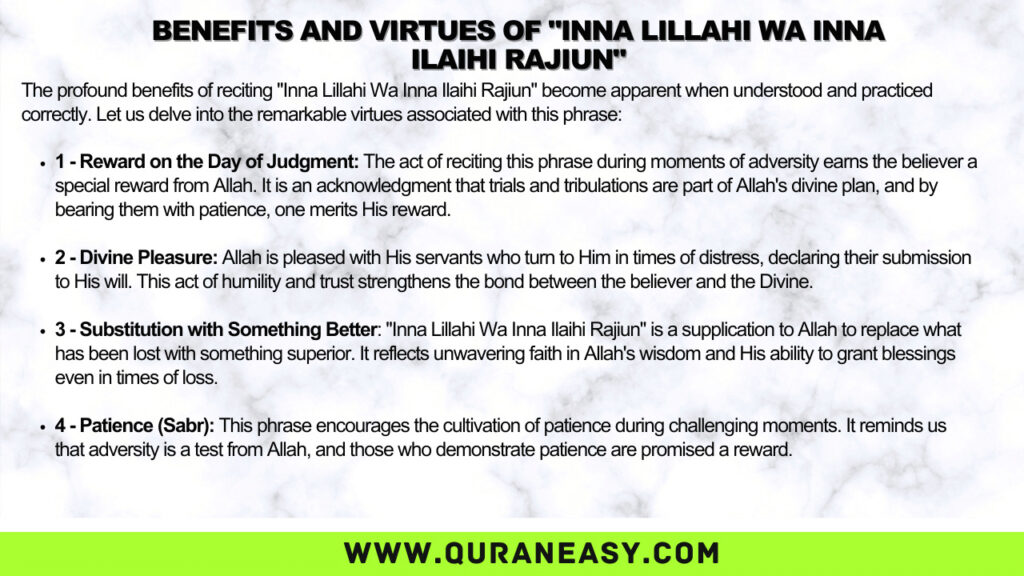
Following the Prophet’s Hadith about Inna Lillah
The beloved Prophet Muhammad (peace be upon him) demonstrated the significance of Inna Lillahi Wa Inna Ilaihi Rajiun through his actions and teachings. He recited this phrase in various situations, setting an exemplary standard for his followers. His teachings emphasize the importance of patience and submission to Allah’s decree, inspiring believers to turn to this profound supplication during times of hardship.
“Inna Lillahi Wa Inna Ilaihi Rajiun” serves as a powerful reminder of our relationship with Allah and our trust in His divine plan. It encourages patience, gratitude, and reliance on the Creator during life’s trials and tribulations.
Inna Lillahi Wa In Allah E Rajioon: Its Profound Effects
The phrase “Inna Lillahi Wa In Allah E Rajioon” is not to be treated as mere habitual or ritualistic words. Instead, it should be recited with mindfulness and deep reflection. This powerful dua holds profound significance and serves as a reminder of our ultimate return to God on the Day of Resurrection, where all that exists belongs to Him. It urges believers to embrace virtues that will ultimately lead to divine rewards.
When to Recite “Inna Lillahi Wa In Allah E Rajioon”
- Beyond Death: Contrary to a common misconception, “Inna Lillahi Wa In Allah E Rajioon” is not exclusively reserved for recitation upon the death of an individual. It holds relevance in various aspects of life, especially during moments of trial and adversity.
- Understanding Patience: Allah, in His infinite mercy, tests His people through various trials, including hunger, fear, loss of wealth, and loss of loved ones. He has made it clear in the Quran that those who exhibit patience during these trials will receive glorious rewards. So, who are these “patient people” that Allah praises?
Allah answers this question in the Quran with the following verse (Al-Baqarah, 156):
“Who, when afflicted with calamity, says: ‘Truly, to Allah we belong and truly, to Him we shall return.'”
The patient people are those who console themselves in times of calamity by reciting this verse, recognizing that every blessing and adversity comes from Allah. They acknowledge His sovereignty and that, ultimately, all beings are His servants who will return to Him. This exemplifies true patience and the proper use of Inna Lillahi Wa In Allah E Rajioon.
In essence, this profound supplication encourages believers to confront life’s challenges with patience, gratitude, and unwavering faith in Allah’s divine plan. It reminds us that we are all on a journey back to our Creator and that everything in this world, including life itself, belongs to Him.
Saying “Inna Lillahi Wa Inallah E Raji oon” as Condolence at the Death of a Muslim
It is considered desirable (mustahabb) to offer condolences to the family of the deceased using words such as these: “May Allah forgive and have mercy on the deceased. May He pardon their shortcomings. May He grant you all patience in facing this severe tragedy, and may He reward you for your endurance in this time of grief and affliction.”
Reciting “Inna Lillahi Wa Inna Ilayhi Raji’un” in Times of Hardship
The verse Inna Lillahi Wa Inna Ilayhi Raji’un can be recited during times of disaster, misery, stress, or any situation that tests one’s patience and faith in Allah. Prophet Muhammad (peace be upon him) himself recited this verse on several occasions and in various situations. A reference to the practice of saying “Inna Lillahi Wa Inallah E Raji oon” in the face of difficulties can be found in the following hadith:
Sayyiduna Husayn ibn Ali narrated that the Prophet (PBUH) said:
“A Muslim man or woman suffers hardship and recalls it, even after a long period of time, and says: ‘We belong to Allah and to Him is our return.’ Allah, Blessed and Exalted, renews a reward whenever it is said, like the reward for it on the day when they were afflicted.” (Mishkat 1759)
Inna Lillahi Wa Inna Ilayhi Raji’un in Arabic
In Arabic text is:
إِنَّا لِلَّهِ وَإِنَّا إِلَيْهِ رَاجِعُونَ
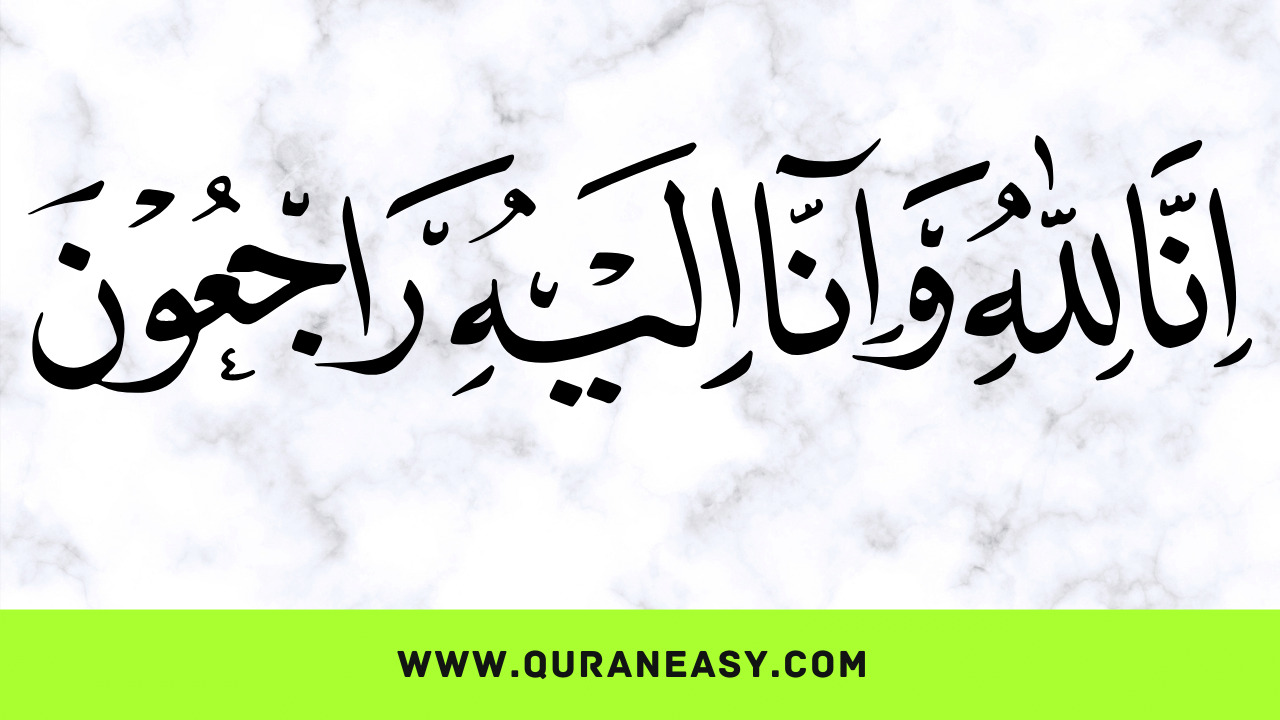
Understanding the Arabic meanings of what you recite can greatly enhance your spiritual connection with God Almighty. To help you in this endeavor, we offer a variety of Arabic language and Online Quran classes suitable for all ages and skill levels. These Quran classes for kids can enable you to deepen your understanding of the Quran and Islamic teachings, fostering a stronger bond with your faith.
Inna Lillahi Wa Inallah-e-raji’oon Translation and Transliteration
There are various spelling variations, and there isn’t one correct version of “Inna Lillahi Wa Inna Ilayhi Raji’un” (إِنَّا لِلَّٰهِ وَإِنَّا إِلَيْهِ رَاجِعُون).
These are English transliterations of the Arabic text, and the common usage should accurately reflect the pronunciation in Arabic.
Therefore, the English transliteration of “Inna Lillahi Wa Inallah-e-rajioon” (إِنَّا لِلَّٰهِ وَإِنَّا إِلَيْهِ رَاجِعُون) can be:
- Inna Lillahi Wa Inna Ilayhi Raji’un
- Inna Lillahi Wa Inallah E Raji oon
Any of these common transliterations can be used to pronounce it correctly.
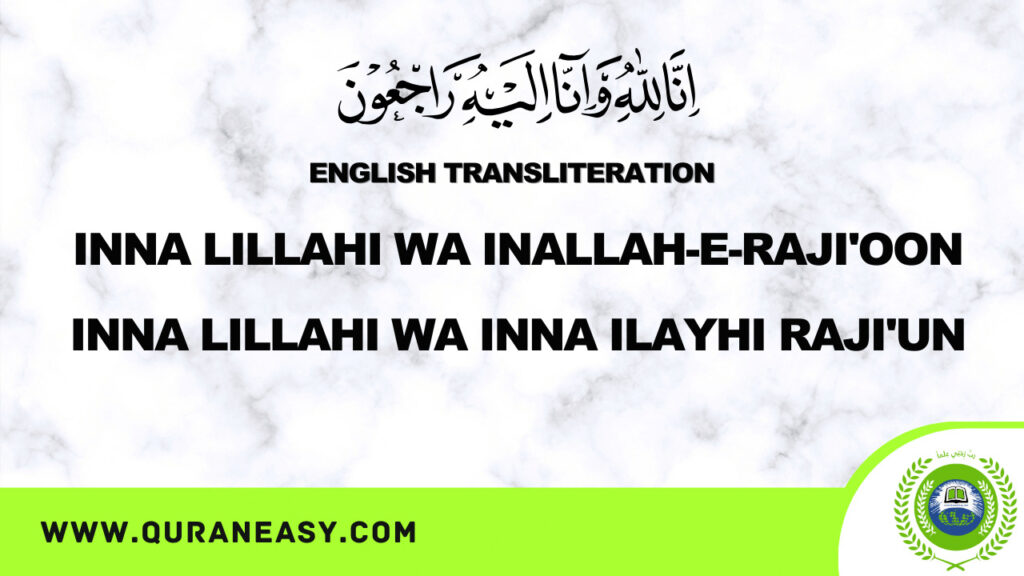
Inna Lillahiwa Inna Ilayhi Raji’oon in Hindi
The phrase “Inna Lillahi wa Inna Ilayhi Raji’un” in Hindi can be transliterated as:
“इन्ना लिल्लाहि वा इन्ना इलयहि राजीऊन”
“हम तो अल्लाह के है और हम उसी की तरफ लौट कर जाने वाले है।
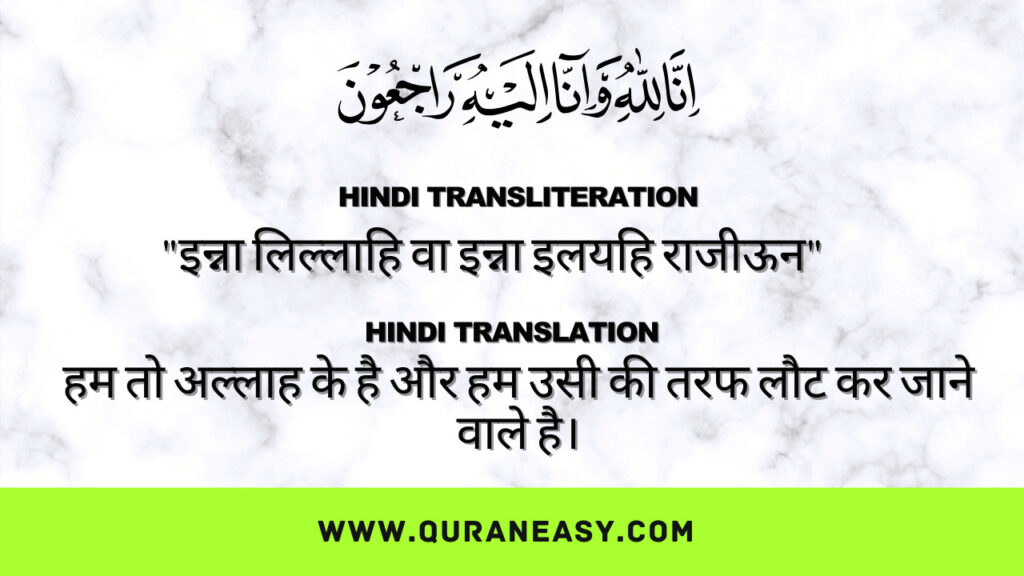
This phrase is often recited in Arabic, but when expressed in Hindi script, it maintains its significance and meaning, signifying that “Surely, we belong to Allah, and to Him, we shall return.” It’s used in times of loss, grief, or as a reminder of our ultimate return to Allah.
Inna Lillahiwa Inna Ilayhi Raji’oon in Urdu
Dua of Inna lillahi wa in allah e rajioon in urdu translation is:
بے شک ہم اللہ کیلئے ہیں اور ہمیں اسی کی طرف لوٹنا ہے۔
This profound verse Inna lillahi wa inna ilayhi raji’un, not only provides solace to those who are mourning but also conveys a profound message to Muslims about the essence of living a life in alignment with Allah’s will. It serves as a poignant reminder that ultimately, we all belong to Allah, and our journey leads us back to Him.
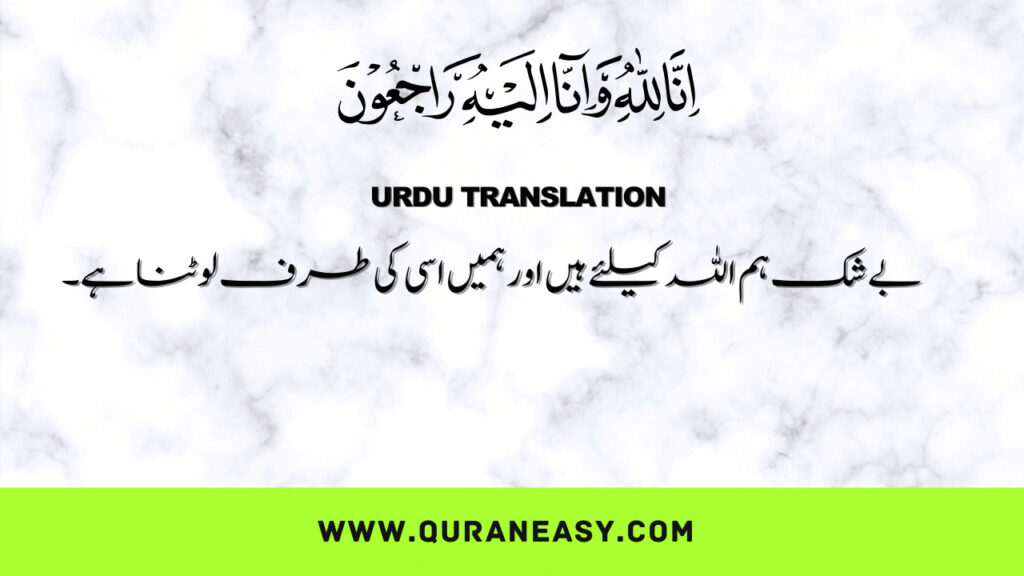
In the face of grief and loss, this phrase offers comfort and reassurance, emphasizing that our existence is intricately tied to Allah’s divine plan. It encourages believers to find strength in their faith, knowing that their loved ones who have passed away are returning to their Creator, who is infinitely merciful and just.
The phrase also highlights the importance of preparation for the inevitable event of death. Muslims are encouraged to maintain a close and sincere relationship with Allah, engage in acts of kindness and charity, seek forgiveness for their sins, and continuously strive to improve their character. Through this preparation, believers aim to meet their Creator with hearts full of repentance and gratitude.
Inna lillahi wa inna ilayhi raji’un is not just a statement; it’s a profound prayer and a reminder of the core principles of Islam. It encourages mindfulness, gratitude, and the pursuit of a life that reflects Allah’s guidance. By embracing this phrase and the values it represents, Muslims find solace in the face of mortality and the certainty of returning to their Creator, allowing them to face the journey of life and death with inner peace and tranquility.
Inna Lillahi Wa Inna Ilayhi Rajioon Meaning
Inna Lillahi Wa Inna Ilayhi Raji’un (إِنَّا لِلَّٰهِ وَإِنَّا إِلَيْهِ رَاجِعُون) is a Quranic verse found in Surah Al-Baqarah, Verse 156.
It carries profound meanings that offer hope to those suffering, strength to those in despair, and guidance to those who may have gone astray.
The verse signifies that we all belong to Allah, and we all will ultimately return to Him. It is not restricted to recitation only for those who have passed away; it serves as a reminder that on the Day of Judgment, every soul will return to Allah.
As mentioned in the Quran (3:185):
“Every soul shall have a taste of death: And only on the Day of Judgment shall you be paid your full recompense. Only he who is saved far from the Fire and admitted to the Garden will have attained the object (of Life): For the life of this world is but goods and chattels of deception.”
This verse or Dua emphasizes our inevitable return to Allah and the reality of the Hereafter, encouraging believers to reflect on their actions and prepare for the ultimate return to their Creator.
How to respond or reply to inna lillahi wa inna ilayhi raji’un
To respond or reply to Inna Lillahi Wa Inna Ilaihi Rajiun, you can say:
“إن لله ما أخذ، وله ما أعطى، وكل شيء عنده بأجل مسمى.”
This response is a way to express condolences and to remind the grieving person that everything belongs to Allah, and He determines the appointed time for everything. It acknowledges the loss while also emphasizing trust in Allah’s plan and wisdom.
Inna lillahi dua for when someone dies
The phrase “Inna Lillahi” is often recited as part of a dua (supplication) when someone dies. It is a way to express condolences and invoke Allah’s mercy and forgiveness for the deceased. Here is a dua that includes “Inna Lillahi” for when someone passes away:
Inna Lillahi wa inna ilayhi raji’un. Allahumma ajirni fi musibati wa akhlif li khayran minha.
Translation: “Surely, we belong to Allah, and to Him, we shall return. O Allah, reward me in my affliction and replace it with something better.”
This dua acknowledges the loss and expresses submission to Allah’s will while also seeking His blessings and protection during difficult times. It is a way to show sympathy and support for the grieving family and to pray for the departed soul’s forgiveness and a better hereafter.


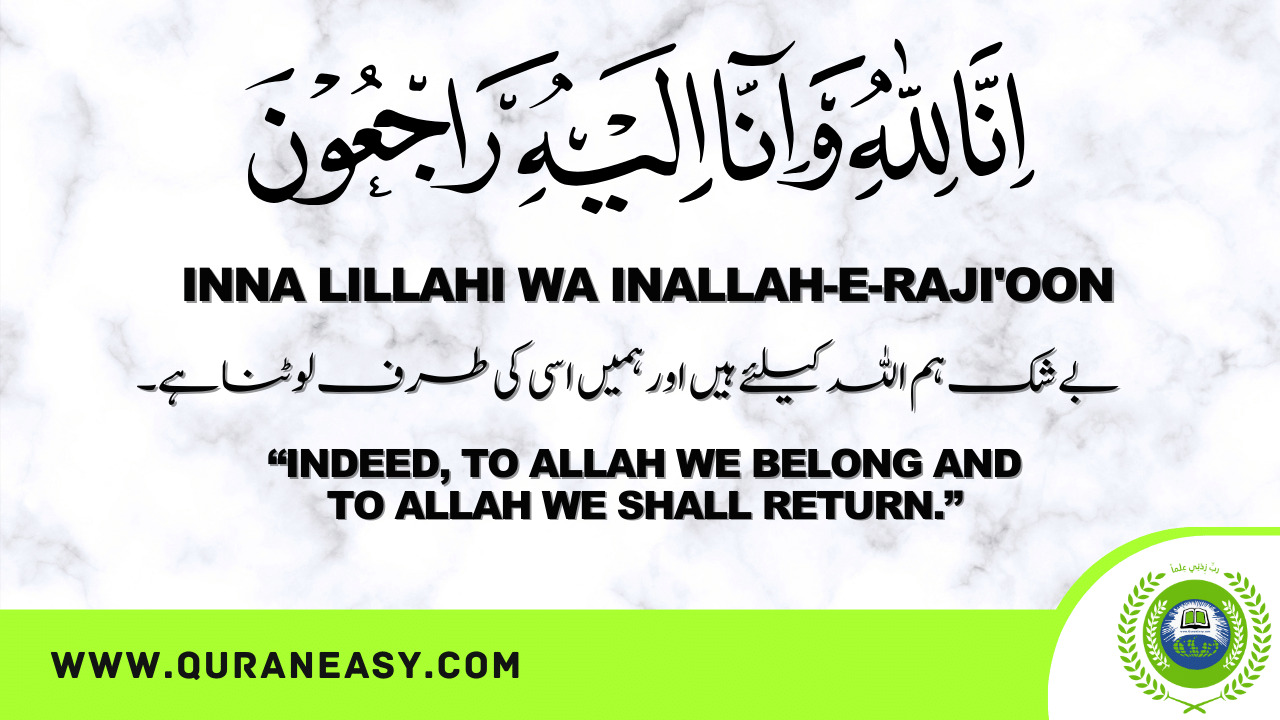


Leave A Comment